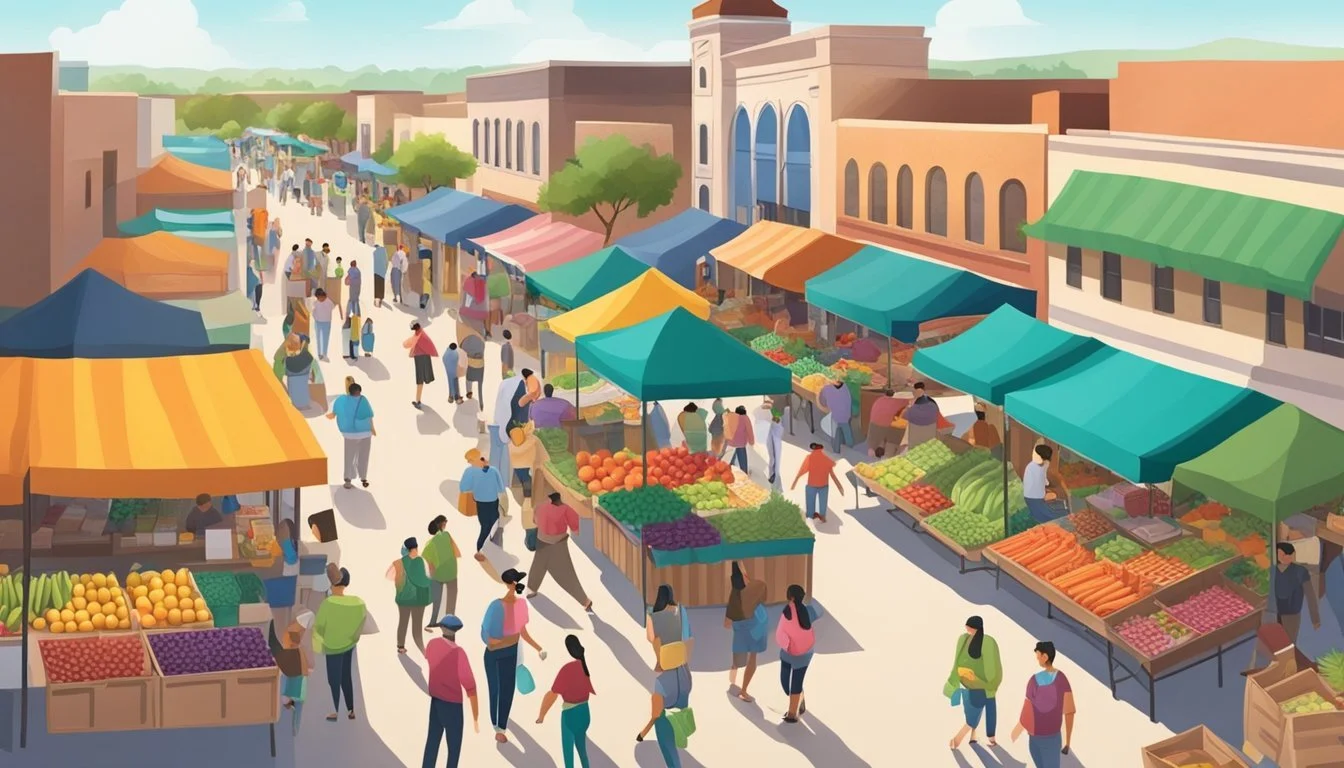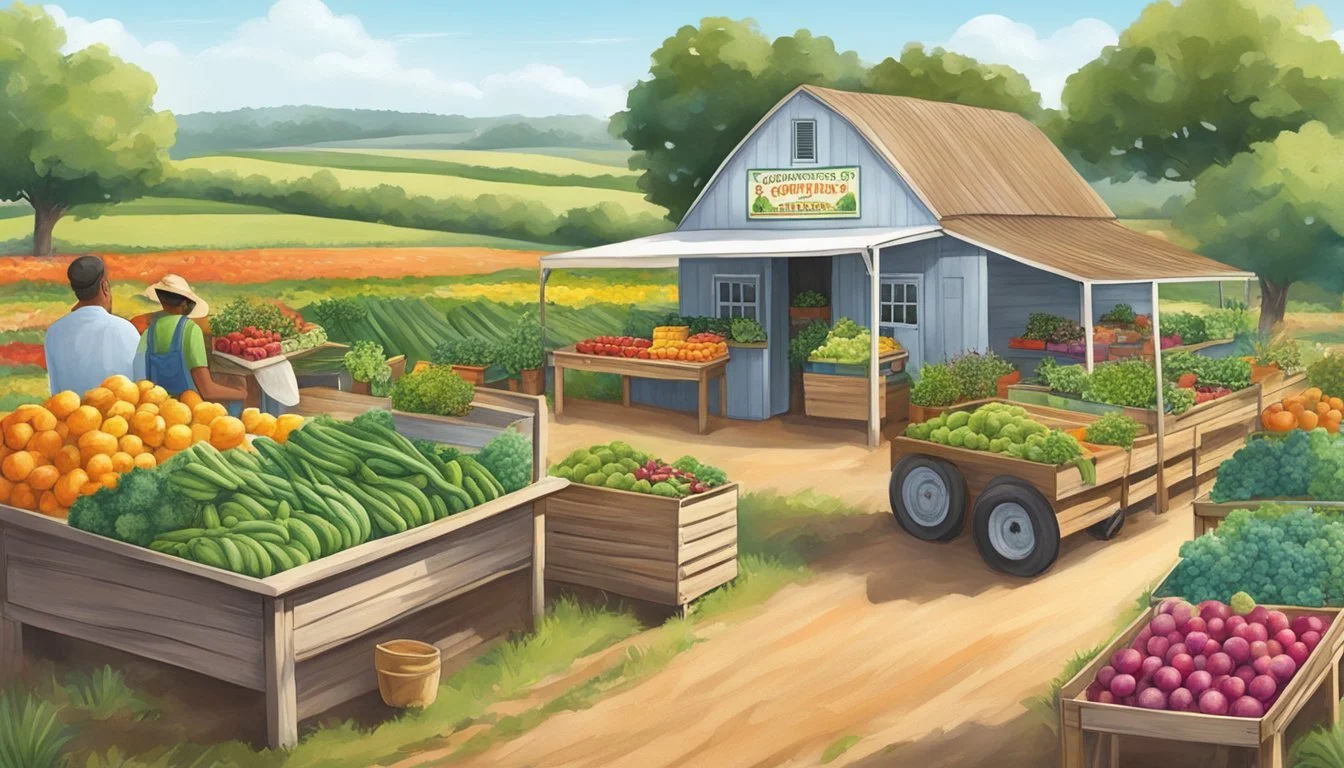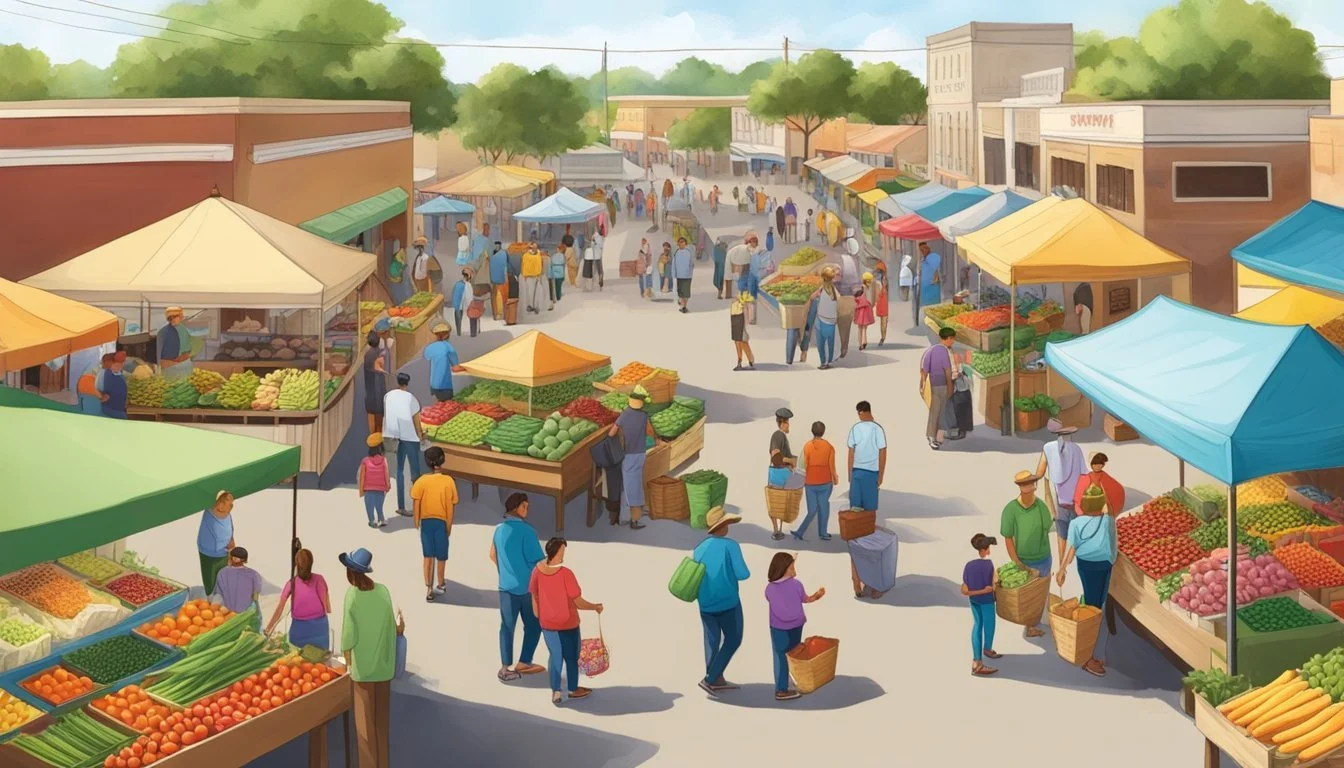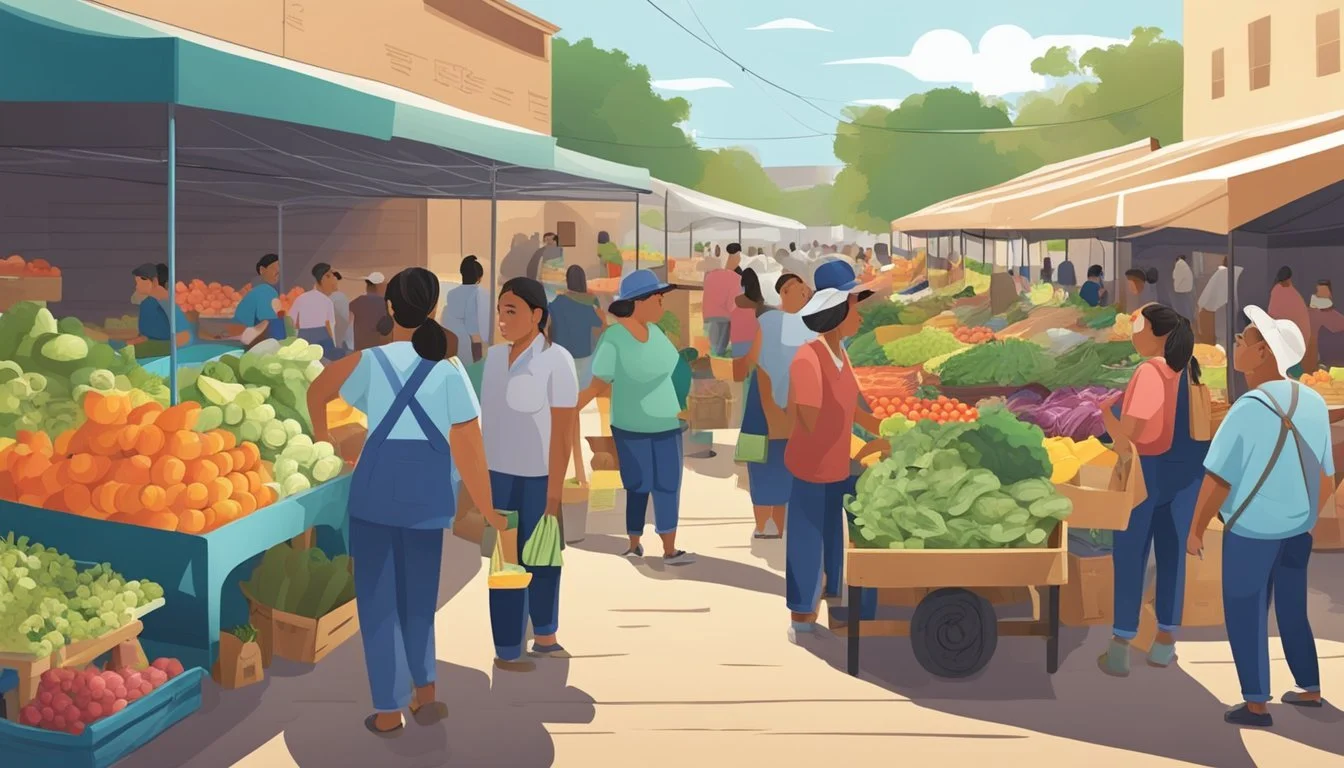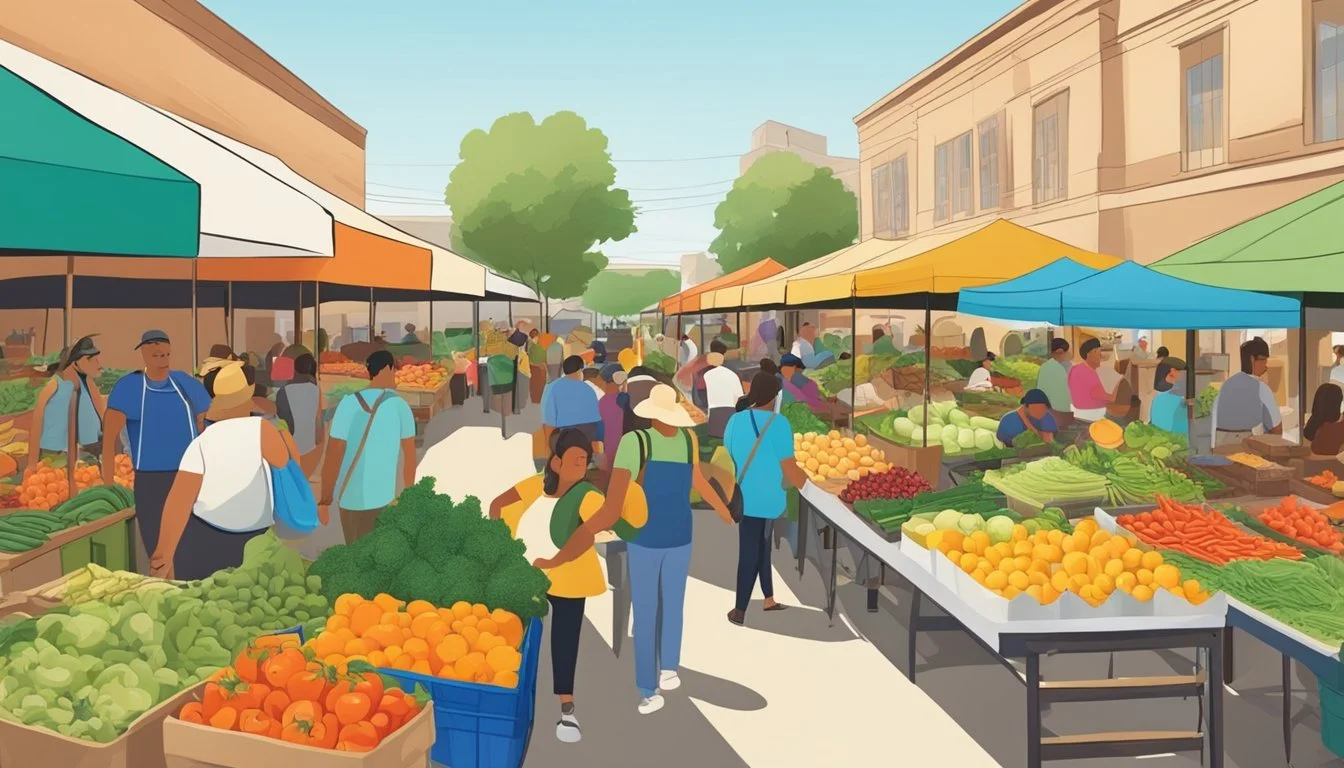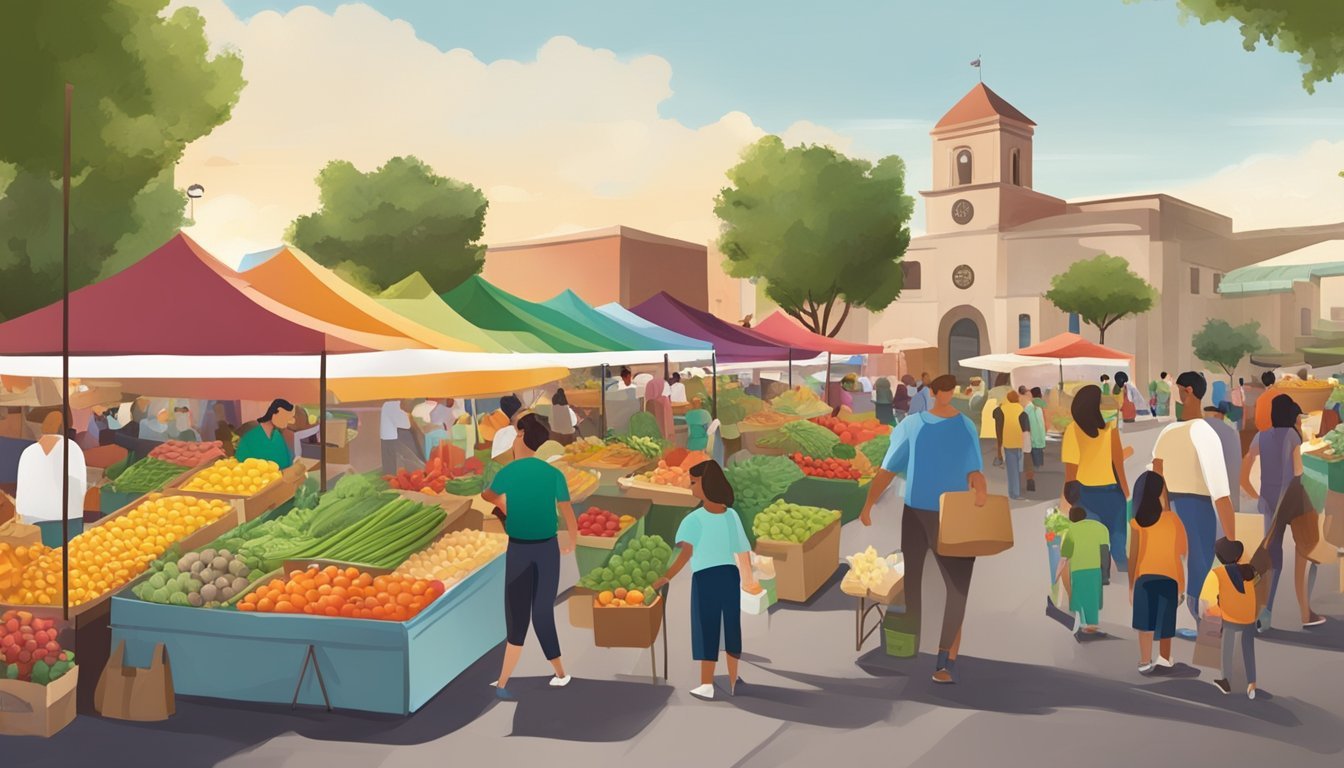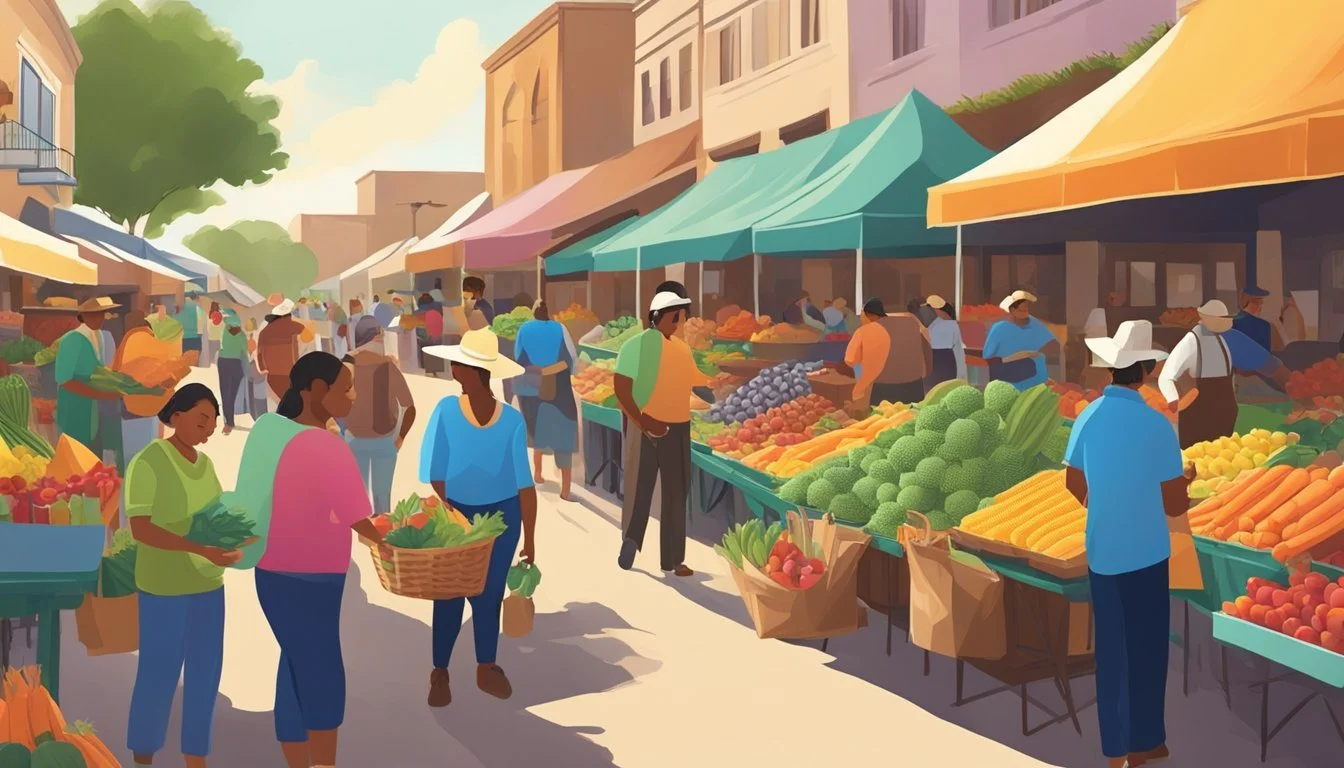Community Supported Agriculture (CSA) in Laredo, TX
A Guide to Local Farm Partnerships
Community Supported Agriculture, commonly known as CSA, is a growing movement in sustainable farming that has taken root in Laredo, TX. CSA programs involve a partnership between local farmers and community members where consumers purchase a "share" of the season's harvest. This model provides residents with a consistent supply of fresh, locally-sourced produce while offering farmers a stable income and a direct connection to their consumer base.
In Laredo, the presence of various CSA options reflects a commitment to supporting local family farms and strengthening the region's food security. Participants in a CSA typically receive weekly or bi-weekly boxes of farm-fresh produce, which include a variety of fruits and vegetables grown in the area. This not only fosters an understanding and appreciation of seasonal eating but also encourages a community-centered approach to agriculture where consumers can actively contribute to the success of local producers.
By choosing to participate in CSA, Laredo residents directly invest in their local food system. This farming model benefits all involved, ensuring that family farms can continue operating and that community members have access to nutritious, sustainable food choices. It's an agricultural practice that reinforces the bond between grower and consumer and cements Laredo's approach to fostering a more connected and resilient local food network.
Understanding CSA
Community Supported Agriculture (CSA) in Laredo, Texas, embodies a partnership between local farms and community members that fosters direct access to high-quality, fresh produce.
CSA Concept and Principles
CSA operates on a simple but powerful principle: consumers (often referred to as CSA members) pay upfront for a "share" of a local farm's expected harvest. This pre-payment model provides the farmer with the necessary capital at the start of the growing season and reduces financial risks. In return, members receive a regular supply of local food, often on a weekly basis, featuring a range of seasonal produce grown by the farm.
Pre-payment: Customers pay for the season’s produce in advance.
Share: A portion of the farm's harvest allocated for customers.
Seasonal produce: Fresh, locally grown food provided according to the harvesting season.
Benefits of CSA for the Laredo Community
Joining a CSA brings multiple benefits to the residents of Laredo:
Freshness: Produce is harvested at its peak, which translates to enhanced flavor and nutritional value.
Connection: CSA cultivates a sense of community by connecting the members directly to the source of their food.
Support Local: It bolsters the local economy, with funds going straight to local farmers rather than being diluted through the supply chain.
Benefits Description Freshness Produce delivered at peak freshness. Community Strengthens ties between members and farmers. Local Economy Direct financial support for local farmers and economy.
The Role of CSA in Sustainable Agriculture
CSA is a cornerstone in sustainable agriculture, promoting environmentally friendly farming practices. By focusing on local food systems, CSA reduces the carbon footprint associated with long-distance transportation. It encourages biodiversity through the cultivation of a variety of crops which is beneficial for the soil and ecosystem. Local farms often employ organic or natural farming methods, which mitigate the use of chemical fertilizers and pesticides.
Biodiversity: Diversity in crops combats soil depletion and promotes a healthier ecosystem.
Reduced Carbon Footprint: Shorter travel distances for food delivery help in lowering greenhouse gas emissions.
Organic Practices: Use of natural farming techniques contributes to less chemical usage.
Through a shared commitment to sustainable practices, CSA in Laredo supports the well-being of both the land and its community members.
How CSA Works
Community Supported Agriculture (CSA) in Laredo, TX, operates on a simple premise: community members subscribe to a farm’s harvest, receiving regular distributions of locally-grown produce throughout the season.
Membership and Subscription
CSA revolves around a membership system. Individuals or families purchase a subscription, termed shares in the CSA context, prior to the start of the growing season. This financial commitment provides the farmer with upfront capital to cover anticipated production costs for the season. In return, members receive a weekly or bi-weekly delivery or pick-up of fresh produce, typically vegetables and fruits, which can vary in quantity depending on the size of the share purchased.
Membership Type Share Size Frequency Produce Variety Full Share Large Weekly Wide Selection Half Share Moderate Bi-weekly Seasonal Mix
Seasonality and Harvest
The harvest season defines the timeframe members receive their produce and usually spans from late spring to early fall, aligning with the region’s optimal seasonal growth periods. During the harvest, the offerings reflect the season’s bounty, ensuring that members enjoy the freshest and ripest veggies. This means the produce selection changes regularly, dependent on what is currently being harvested. The farmer communicates these variations, ensuring members know when to expect classics like tomatoes and when to prepare for less familiar vegetables like kohlrabi or bok choy.
Season Likely Harvest Spring Leafy greens, radishes, herbs Summer Tomatoes, peppers, melons Fall Squash, root vegetables, apples
Local Farms and Produce
In Laredo, TX, CSA farms play a vital role in connecting consumers with high-quality, local produce, offering an array of farm-fresh products from vegetables to meats. These farms commit to sustainable agriculture, ensuring that the community benefits from the freshest seasonal offerings.
Profiles of Participating Farms
River's Edge Farm specializes in a variety of leafy greens and root vegetables. They prioritize organic methods and have built a reputation for their heirloom tomatoes and sweet peppers.
Prairie Blossom Ranch offers more than just produce; this farm provides pasture-raised meats including chicken and beef, known for its tenderness and flavor.
Sunset Orchard prides themselves on their juicy peaches and crisp apples, with their fruit orchards becoming a local favorite for u-pick experiences during the season.
Range of Products
Laredo's CSA farms supply a wide spectrum of products:
Vegetables: A seasonal rotation including everything from lettuce and carrots to exotic varieties of squash and okra.
Fruit: Citrus, berries, and stone fruits are commonly available, with availability aligned with Texas growing seasons.
Eggs & Cheese: Farm-fresh eggs and artisanal cheeses, often from free-range poultry and grass-fed dairy cows.
Meat: Options consist of beef, pork, and chicken, with some farms offering specialty meats like lamb or goat.
Additional Fresh Produce: Many local farms branch out into herbs, flowers, and handcrafted jellies, catering to a full gastronomic experience.
Consumers can expect to fill their tables with vibrant, nutritious food while supporting Laredo's agricultural community.
Economical Aspect of CSAs
Community Supported Agriculture (CSA) offers a subscription-based model for obtaining local produce, where the cost and saving strategies are inherent to its structure. It presents an intriguing economical framework for both customers and farmers in Laredo, TX.
Cost and Fee Structure
CSA memberships typically involve a seasonal fee that customers pay upfront. This fee grants the member a share of the harvest throughout the CSA season. The structure may vary, but generally, it includes:
Full shares: suitable for larger households, often priced between $500 to $700 per season.
Half shares: designed for smaller households or individuals, ranging from $275 to $350 per season.
These fees cover a portion of the farmer's production costs and provide members with fresh produce on a weekly or bi-weekly basis.
Saving Money with CSAs
Members can save money by participating in a CSA for several reasons:
Elimination of middlemen: CSAs bypass traditional supply chains, eradicating additional costs associated with transport, handling, and retailing.
Bulk purchase: The upfront fee can result in a lower overall cost per unit of produce over the season.
Peak freshness: CSA produce is harvested at optimal ripeness, potentially reducing food waste due to spoilage.
By understanding the economical facets of CSA memberships, Laredo residents can make informed decisions on their food spending while supporting local agriculture.
Community Engagement
Community Supported Agriculture (CSA) in Laredo, TX is fostering noteworthy connections between local farmers and area residents, enhancing the fabric of community engagement. Through shared commitment, CSA members receive fresh produce, meanwhile contributing to the economic stability and growth of local farms.
Strengthening Farmer-Consumer Relations
Key to Laredo's CSA success is the personal bond between farmer and consumer. A CSA membership goes beyond the transactional; it nurtures a relationship where consumers understand the challenges and successes of their farmers. This connection is anchored in the exchange of value - upfront payment by members ensures a stable income for farmers and yields a regular supply of fresh, seasonal produce for consumers.
Creating a Sense of Community
The CSA model inherently builds a sense of community. In Laredo, community members actively engage in food procurement processes that root community development in the local food landscape. They're not just customers; they're active participants in a food ecosystem that is sustainable and supportive. This investment in local agriculture cultivates a connected, health-conscious community, eager to support and sustain its food producers.
CSA Management and Operations
Community Supported Agriculture in Laredo, TX navigates complex systems of management and operations to effectively connect consumers with fresh, local produce. At its core, the success of a CSA hinges on the robust management of its business model and the efficiency of its logistics and distribution networks.
Business Models for CSA
CSAs in Laredo, TX typically operate on a subscription basis, where consumers purchase "shares" of produce for a season. This upfront capital helps farmers plan and manage their farm's financial needs. Businesses within the CSA framework may vary, encompassing single-farm operations or multi-farm collaborations. The latter can form an association to strengthen their marketing strategies and share resources. They must actively manage customer expectations, farm production, and financial sustainability.
Single-farm CSA: Direct connection between farmer and consumer.
Multi-farm CSA: Collaboration between several farms to offer a wider variety of products.
Logistics and Distribution
The logistics and distribution systems are crucial in delivering fresh produce to CSA members. Farms must organize distribution points, which can include on-farm pickups, local markets, or drop-off locations. Efficient distribution is a form of marketing itself, assuring members of the farm's dedication to service. The network of distribution points also determines the geographical reach of the CSA, potentially broadening the customer base.
Distribution Points:
On-farm pickup
Designated drop-off points
The proper handling of these components contributes to the overall effectiveness and sustainability of the CSA model in Laredo, offering consumers an opportunity to support local agriculture directly.
Benefits of CSA to Consumers
Community Supported Agriculture provides tangible advantages to consumers in Laredo, TX. They benefit from improved health and nutrition by accessing fresh, local produce throughout the season.
Health and Nutrition
Consumers in CSA programs often experience enhanced health and nutrition. Being part of a CSA offers individuals:
Access to a variety of fresh produce that is often organic and less processed.
Exposure to produce at peak nutritional value, as the time between harvest and consumption is minimal.
Access to Fresh, Local Produce
CSA members enjoy direct access to fresh, local produce that supports the local economy. Key marketing aspects related to CSA include:
Weekly shares of produce that encourage a steady supply of seasonal foods.
Supporting local food systems, which often benefit the environment due to reduced transportation distances.
Challenges and Considerations
Community Supported Agriculture (CSA) in Laredo, Texas, must navigate unique challenges while considering strategic tips for success to sustainably support local agriculture and community health.
Addressing Potential Obstacles
CSAs in Laredo encounter specific challenges such as unpredictable weather patterns, which can impact crop yields and subsequently affect the reliability of food shares. Data on local climate trends can help forecast disruptions, allowing farmers to adapt cropping schedules.
Market Competition: With the presence of larger supermarkets, CSAs need to emphasize the value of fresh, locally-grown produce. Establishing strong relationships with local consumers is crucial for retention.
Logistical Constraints: Efficient distribution becomes a challenge as CSAs grow. Implementing drop-off points or collaborative distribution networks can optimize delivery.
Regulatory Hurdles: Complying with food safety regulations requires a clear understanding and application of local agricultural codes, which can be both time-consuming and costly.
Tips for Success
Tips for success hinge on adapting to challenges with resourceful and innovative strategies.
Community Engagement: Engage community stakeholders by holding events and educational programs, thereby fostering community involvement and ensuring better market visibility.
Diversified Crop Planning: Diversify crops to mitigate risks associated with specific crop failures and to cater to diverse consumer preferences.
Utilization of Technology: Incorporate data management tools for tracking member preferences, payments, and communications to enhance operational efficiency.
By meticulously confronting these obstacles and applying the right strategies, CSAs in Laredo aim to steadfastly enrich the local food system and economy.
CSA Impact on the Environment
Community Supported Agriculture (CSA) in Laredo, TX, champions sustainable agriculture by fostering practices that are in harmony with the local environment. By engaging in CSA, consumers directly support farming methods that replenish the soil rather than deplete it, thereby promoting long-term ecological balance.
CSAs typically encourage crop diversity, a stark contrast to single-crop farms. By rotating various crops, CSA farmers in Laredo help maintain soil health, reduce pests, and limit the need for chemical fertilizers and insecticides. This kind of agricultural biodiversity is instrumental in creating a resilient food system.
Listed below are key environmental benefits associated with Community Supported Agriculture:
Reduced Carbon Footprint: Localized food systems cut down on transportation needs, which translates to fewer emissions and a smaller carbon footprint. CSA food travels a much shorter distance from farm to table, as compared to conventional supply chains.
Lower Resource Use: CSA farms tend to use fewer resources such as water and energy. This is possible due to more precise production based on member demand, and often through the use of natural growing phenomena.
Enhanced Animal Welfare: CSAs that include livestock usually adopt more humane animal husbandry practices. They often provide open pastures and avoid the overcrowding seen in industrial farming setups.
Environmental Stewardship: CSA members and farmers share a commitment to protecting the environment, which often results in farms implementing more sustainable and eco-friendly practices.
In Laredo, Community Supported Agriculture is not just a means of procuring fresh produce but a collective endeavor to foster a healthier planet. As members invest in their local farms, the environmental payoff extends beyond their tables to the broader natural landscape of the region.
Understanding the Laredo Region
Laredo, TX, sits prominently in the southern part of Texas and serves as a pivotal hub for cross-border commerce between the United States and Mexico. The region boasts a rich tapestry of cultures, a reflection of its status as a border town. The community is marked by resilience and a strong sense of identity, ingrained in the local customs and traditions.
Geography and Climate
The geography around Laredo encompasses a semi-arid landscape, where the Rio Grande River plays a critical role in the area's agriculture and ecology. Rapid urban expansion is balanced with a dedication to preserving the natural beauty of the region. The climate is characterized by hot summers and mild winters, affecting agricultural practices and the types of crops that can be grown successfully.
Agricultural Community
The communities in the Laredo region have a longstanding connection to the land, with agriculture being a vital component of the local economy. In recent years, there has been a growing interest in sustainable farming practices. Community Supported Agriculture (CSA) programs have begun to spring up, strengthening the bond between consumers and local farmers. These CSA initiatives help support the regional economy and provide fresh, in-season produce to community members.
Local Support
Residents understand the importance of supporting local enterprises. Participating in CSA allows them to contribute directly to the success of local farms. This alignment has fostered a relationship where reciprocal benefits drive a burgeoning local food system.
The push towards sustainable practices in the Laredo area is more than just an economic choice; it reflects an understanding that the region's future is tied to the land and the people who work it.
CSA in the Digital Age
In recent years, Community Supported Agriculture (CSA) has embraced digital tools to enhance its reach and efficiency. Laredo, TX’s CSA programs have adapted by integrating applications that allow consumers to sign up for memberships with ease. These apps often include features such as membership management, payment processing, and real-time updates on produce availability.
Data analytics play a crucial role in modern CSA operations. Farmers can predict harvest yields more accurately, allowing for better planning and allocation of resources. This use of data ensures that members receive a consistent supply of fresh produce and also helps in reducing food waste.
Digital marketing strategies have also revolutionized the way CSA farms connect with their local communities. Social media platforms are commonly used to showcase the seasonal offerings, share recipes, and post updates about the farm's activities. This online presence not only educates the public about the benefits of supporting local agriculture but also helps in building and maintaining strong relationships with members.
Membership models have seen a transformation as well, with online subscription services simplifying the sign-up and renewal processes. An easy-to-navigate website or app enhances the member experience, ensuring that managing their CSA subscriptions is straightforward and transparent.
Feature Benefit Online Sign-Up Streamlines membership process Real-Time Updates Keeps members informed about produce Data Analytics Leads to efficient resource allocation
In Laredo, CSA initiatives continue to grow through these digital enhancements, ensuring a resilient local food system and sustained support for local farmers.
Supporting Materials
The Supporting Materials section provides essential resources for community members to access local farm products and to utilize them effectively in their home cooking.
Local Food Directories and Resources
Community members seeking fresh, local produce can reference the following directories:
TexasRealFood: Connects consumers with local farms and ranches offering CSA subscriptions.
Farmers Market Locators: Use online maps or apps to find nearby markets with farm-fresh goods.
These directories serve as a bridge between Laredo residents and their local food systems, ensuring that consumers can easily find and support regional producers.
Recipes and Cooking Tips
Once in possession of fresh produce, consumers might benefit from guidance on how to incorporate farm products into their meals. The following resources are available:
Seasonal Recipe Collections: Curated by cooking experts, they provide inspiration tailored to current harvests.
Cooking Guides: Detailed instructions for preparing farm-specific items, helping to reduce food waste by utilizing the entirety of the produce.
Recipe collections often include tips on storage and preservation to extend the shelf-life of farm produce, enhancing the CSA experience. Cooking guides focus on both basic and advanced techniques to cater to a range of culinary skills.
Conclusion
Community Supported Agriculture (CSA) represents a keystone in Laredo's progressive local food movement. The CSA model fosters a robust relationship between Laredo farmers and the community, supporting sustainable agriculture practices that benefit both the environment and the local economy.
Environmental Impact: CSA in Laredo contributes to a reduction in food miles, leading to a lower carbon footprint. Sustainable farming practices encouraged by CSA participation promote soil health and biodiversity.
Economic Benefits: Local farmers gain financial stability through pre-season capital, enabling them to plan and execute more effective farming strategies. This, in turn, strengthens Laredo's local economy.
Community Engagement: By participating in a CSA, residents of Laredo engage directly with the source of their food, nurturing a closer community bond and greater food literacy.
It is evident that CSA models are integral to the cultivation of resilient local food systems. Laredo's commitment to such agricultural endeavors is commendable and sets a precedent for other cities aiming to integrate more sustainable food networks. The ongoing success of CSA in Laredo indicates a positive trajectory for the future of communal support in agriculture and local, sustainable food consumption.

